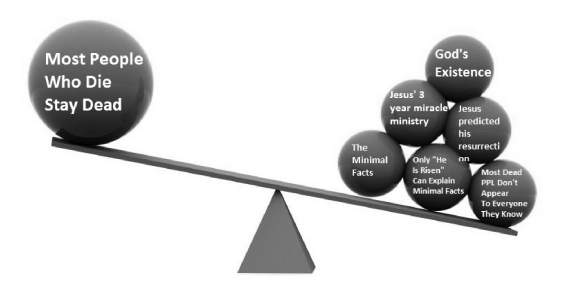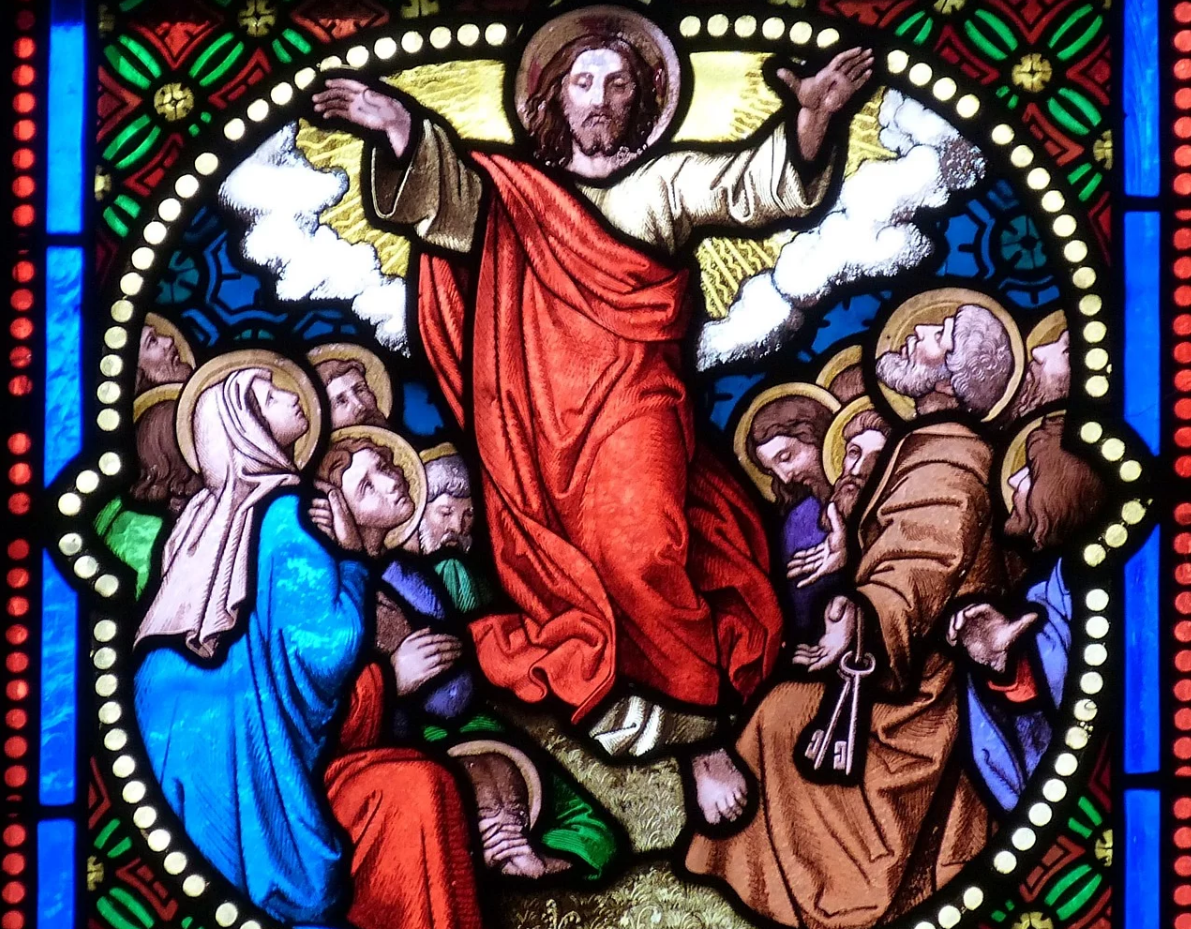 Mr. Minton,
Mr. Minton,
First of all, thank you so much for your huge body of work on this site. I’ve been diving deep into the question of Christianity’s truth lately and your work has given me some invaluable insight. It introduced me to the minimal facts argument for Jesus’ resurrection, and I’ve developed high hopes of this argument being the clincher for me returning to Christianity.
But I’m hung up on the issue of miracles. I read part 9 of your series, “The Evidence for Jesus’ Resurrection,” and I feel the need to play devil’s advocate. Suppose I’m a stubborn atheist who wants to compound multiple naturalistic theories to explain away the minimal facts. For example, the “stolen body” theory plus the “hallucination” theory. Maybe a group of strong men overpowered the tomb guards at night, rolled the stone away, and stole Jesus’ body; then, later on, hundreds of people had the same incredibly powerful hallucination that they had seen the risen Jesus, prompting some of them to preach the truth of the Resurrection and even die in Jesus’ name.
Both theories, on their own, fail to explain the minimal facts. But when put together into a single theory, they do explain the facts. Of course, with so many unlikely details compounded together, the story as a whole is astronomically improbable. But are we really justified in making the assertion that miracles, which you acknowledge are also unlikely, are indeed the more likely explanation? After all, it seems that probability is the only deciding factor that remains, given that the “miracle theory” and the “wild story” theory both explain all the facts.
I want Christianity to be true, and I want my objections to be invalid. I look forward to hearing what you think. Thanks for your time, and again for your continuing work on Cerebral Faith.
- Josh
 I am thrilled that you have been going through my blog post series on the resurrection of Jesus, Josh. Fortunately for you, your objections are indeed invalid. I addressed them in the book My Redeemer Lives: Evidence For The Resurrection of Jesus which adapted and expanded upon the 10 part series you referred to. These two objections are really where most non-Christian historians land nowadays.
I am thrilled that you have been going through my blog post series on the resurrection of Jesus, Josh. Fortunately for you, your objections are indeed invalid. I addressed them in the book My Redeemer Lives: Evidence For The Resurrection of Jesus which adapted and expanded upon the 10 part series you referred to. These two objections are really where most non-Christian historians land nowadays.
When I was at The National Conference On Christian Apologetics in 2017 in Charlotte North Carolina, Dr. Gary Habermas said in his lecture “Evidence For The Minimal Facts” that most non-Christian historians will agree with the Christian historians that the minimal facts are facts; that (1) Jesus died by Roman crucifixion, (2) His tomb was found empty by a group of women followers, (3) The disciples claimed and believed Jesus appeared to them alive, (4) Paul experienced a postmortem appearance of Jesus, and (5) James experienced a postmortem appearance of Jesus. Pretty much everyone agrees that these 5 things are historically factual. And they also will admit that none of the naturalistic theories one could posit to explain them are sufficient to account for them. In fact, the late hardcore atheist-turned-deist Anthony Flew said “The evidence for the resurrection is better than for claimed miracles in any other religion. It’s outstandingly different in quality and quantity.”1
At this point, non-Christian scholars argue that the resurrection hypothesis is so highly improbable that it cannot even be considered. This the objection Bart Ehrman brings up in his debates with apologists like William Lane Craig and Michael Licona. So, all we’re left with is a question mark on what occurred that first Easter morning. Allow me to address both of these in the order that you’ve given them.
Your point is essentially the same. You realize the problems with a stolen body + multiple multi-mode hallucinations but essentially say; is this anymore improbable than that the dead Nazarene resurrected? If so, then the naturalist who wants to cling to a fantastically wild stolen body/multiple hallucinations scenereo is just as justified as the Christian.
There are a number of reasons why I don’t think this objection works.
1: Assuming They Are Both Equally Likely, Ockam’s Razor Favors Resurrection
Ockam’s Razor (or Occam’s Razor) says that if you have two competing hypotheses that can explain the data equally well, the one that makes the fewest assumptions or posits the fewest explanations should be preferred. When it comes to your combination theory and Jesus’ resurrection, Jesus’ resurrection clearly makes fewer assumptions and posits fewer mechanisms for explaining the data. The only additional assumption the resurrection hypothesis requires is that an omnipotent God exists and is capable of doing things like raising the dead. By contrast, on the other theory, you have to posit (1) that someone stole the body, (2) that the people who stole the body, whoever they were, were powerful enough to overwhelm the guards, (3) that the twelve disciples, the apostle Paul, the apostle James, and 500 eyewitnesses experienced hallucinations that were (4) of a multi-sensory nature.
“He is risen” is just a much simpler explanation. Thus, by Ockam’s Razor, we should go with this explanation than that combinatory naturalistic theory.
2: Combining Theories Doesn’t Alleviate Problems They Had When Considered In Isolation
Multiple multi-sensory group hallucinations are so fantastically improbable that this is an unreasonable theory, we have no reason to believe anyone would have a motivation to steal the body. The disciples wouldn’t because then they wouldn’t die for what they knew was a lie, the religious leaders would know removing the body would make some people think Jesus rose from the dead, and we have no reason to think the Romans were anything but apathetic to Jesus at this particular moment in history.
It can be put very simply like this; one bad theory + one bad theory + one bad theory = a really bad theory, not a good one.
Plus, positing multiple naturalistic theories smack of the ad-hoc fallacy.
3: When All Of The Evidence Is Considered In Conjunction, A Miracle Is Far More Likely
A resurrection of a man is fantastically improbable if the background information is all we had to go on; that being that out of all the people we know of who died, none of them came back. You could probably interview every person who lost a loved one in 9/11’s terrorist attack and not one of them would have claimed their loved one rose from the dead. Certainly, none of my pets or grandparents came back to life.
But we’re not only taking into account ratio of resurrections to people who stayed dead. We also have
(1) The Minimal Facts
that (1) Jesus died by Roman crucifixion, (2) His tomb was found empty by a group of women followers, (3) The disciples claimed and believed Jesus appeared to them alive, (4) Paul experienced a postmortem appearance of Jesus, and (5) James experienced a postmortem appearance of Jesus.
(2) That No Naturalistic Theory Ever Proposed Can Explain The Minimal Facts
The Hallucination theory, The Swoon Theory, The Stolen Body theory (Fraud A and B), Embellished Legend Theory, Copycat Theory, The Twin Theory, The Alien Theory, The Pauline Conversion Disorder theory, etc. are all abject failures. Most of these fail to even account for one of the minimal facts, much less all of them. The best of them can account for one fact at most but the majority don’t even go that far. The resurrection hypothesis can explain all of these. Sherlock Holmes once said, “Once you eliminate the impossible, whatever remains, no matter how improbable, must be the truth.”2
(3) The Existence Of God
If God exists and is powerful enough to perform the kind of acts we would call miracles, then wouldn’t you agree that this makes Jesus’ resurrection MUCH more probable than if we were assuming philosophical naturalism from the start? The late Anthony Flew certainly thought so. He said “Certainly, given some beliefs about God, the occurrence of a resurrection does become enormously more likely.”3
If God exists, miracles are possible. That, by itself, upsets the whole probability structure. We’ve got very strong arguments for God’s existence, and I’ve written about them in several places. One place is in my book The Case For The One True God, but there are also many articles on this site that defend them. Check out The Kalam Cosmological Argument, The Fine-Tuning Argument, The Moral Argument, The Ontological Argument, The Argument From Beauty, and The Argument from Contingency. Michael Jones of Inspiring Philosophy has developed a really interesting Cosmological argument drawing on current findings in quantum mechanics. It’s called “The Digital Physics Argument For God’s Existence”.
The Cosmological and Ontological arguments are of special interest as these arguments show that the God these arguments point to bares the property of omnipotence. So I recommend checking these out.
(4) The Historical Reliability Of The New Testament
Although the historical reliability of The New Testament isn’t essential to concluding Jesus’ rose from the dead (since the criteria of authenticity can extract historical nuggets of information even in unreliable documents), it certainly is the case that if the gospels and epistles are reliable testimony, that increases the chances that the resurrection occurred. Craig Blomberg noted 54 historically verified facts that the gospel of John got right in his book The Historical Reliability Of John’s Gospel and Colin Hemer noted 84 historically verified facts that the book of Acts got right in his book The Book of Acts in the Setting of Hellenistic History. If John and Luke were able to accurately record historical details even in the most obscure and minute details (like the proper offices and titles of reigning governers) what are the odds that they’d get it wrong on the most essential event in their narratives?
I don’t currently have very much on this site on New Testament reliability. I hope to get some content up here on this sometime this year. In the mean, Michael Jones of Inspiring Philosophy has an entire video series going into that. I recommend checking out Jones’ series.
(5) The Existence Of The Minimal Facts Would Be Improbable If Jesus Did Not Rise
I would argue that if Jesus didn’t rise from the dead, then it’s extremely improbable that the minimal facts should be facts. I would argue that in light of the hypothesis “Jesus did not rise from the dead”, then His tomb should be occupied, His disciples should never have claimed and come to believe that they had seen him, and Paul and James should have remained skeptical for the rest of their lives.
Here’s an analogy; let’s say that a woman is brought before a jury on charges of murder. She’s accused of having killed her young son. Now, at the start, you might think that it’s extremely unlikely that she is guilty. After all, the vast majority of mothers who’ve ever lived do not harm their children. They love and care for them.
In light of this background information, the claim that she is guilty is enormously improbable, and you’d be justified in thinking that the defendant was innocent if that background knowledge was all you had to go on. However, investigators found a bloody knife in the back seat of her car next to a mud-covered shovel. In her house, they found a pair of pants that also had been chemically spot cleaned. They also have several eyewitnesses who said that they heard a child screaming just before seeing the defendant carrying a black garbage bag and a shovel out her house in the middle of the night, the same night as the murder. When investigators found the dead child, he was in a black garbage bag. The defendant also had a history of mental illness and domestic violence. In light of these “minimal facts”, the claim “She is not guilty” becomes improbable. The defendant’s attorney threw out every alternative explanation he could think of, but the jury all saw the various holes in them and rejected them. They knew that the claim “This woman murdered her child” could explain all of the evidence. Even the best of the defense attorney’s explanations could account for one piece of evidence at the crime scene at most, but the majority of his alternative explanations didn’t even go that far. The only explanation that worked is “This woman murdered her child”.
Now, it would be an invalid move on the part of the defense attorney to argue that the majority of mothers care for their children rather than killing them, and he’s never witnessed a woman murder her child, and so the probability against any mother ever killing her child is so great that they should return with a “not guilty” verdict. Sure, the hypothesis “this woman killed her child” is improbable in light of the background information that mothers usually don’t kill their sons and that we’ve personally never witnessed a mother kill her son, but the guilty verdict is still justified.
In fact, the existence of the evidence is improbable if she is not guilty. If she’s not guilty, the detectives should not have found what they found. If she didn’t do it, what are the odds that “the minimal facts” at the trial (the blood-covered knife in the back of the car, the muddy shovel in the trunk, the dead child being found in a black garbage bag, the eyewitness statements of her leaving the house with a black garbage bag and shovel, and the history of mental illness and domestic violence) should all exist? In the same way, the existence of the minimal facts (1) Jesus died by crucifixion, (2) Jesus’ Empty Tomb, (3) Postmortem Appearances To The Disciples, (4) Postmortem Appearance To Paul, and (5) the postmortem appearance to James, should not exist if Jesus did not rise from the dead.
It’s enormously improbable that these five facts would be true if Jesus did not rise from the dead. Of all the dead people we know of, none of them left an empty grave behind and started showing up to us and everyone we knew. When my grandfather passed away in 2001, my parents and I didn’t go down to the tomb the next day, find it empty, then come back home to find him standing in our living room saying “peace be with you”. That didn’t happen when my grandmother died in 2003 either. Her casket stayed occupied, and we didn’t see her again after that. My cat Sunshine died in 2011. We buried him in a cardboard box in our front yard. To this day, his body remains in that box, and no one saw him meowing at the front door just a few days later. More recently, my dog Max died and my father and I buried him behind our shed. His grave also remains occupied, and none of us saw him sitting in the front yard wagging his tail 3 days later. Now, certainly there have been people who claimed to see the spirit of their loved one appear before them shortly after they die. You only need to watch one or two episodes of Unsolved Mysteries to know that. However, while Grandpa might show up to Grandma in their bedroom for a few moments before departing to the afterlife, Grandpa’s not going to show up to Mom, Dad, his grandchildren, his siblings, an entire stadium of people, and his co-worker who hates his guts, and Grandma isn’t likely to find to Grandpa’s body missing from the cemetery. That kind of thing just doesn’t happen with people who aren’t resurrected. However, that happened following Jesus’ death. The skeptic can argue “Dead people usually stay dead”, but I can retort “Dead people usually don’t disappear from their graves and immediately proceed to appear in front of everyone they knew”. It would be astonishing that the 5 minimal facts are facts if Jesus didn’t actually rise from the dead.
To return to the analogy at the beginning of this subsection, if the woman didn’t kill her child, there should at least be a viable alternative theory than “she is guilty”. Likewise, there should at least be a viable explanation for the minimal facts than “He is risen”. Alas, there is no other explanation. Hallucinations, Apparent Death, Stolen Body theories, all fail to account for the minimal facts.
(6) The Shroud Of Turin’s Validity
This one’s debatable, but if the Shroud Of Turin is legitimate, that would certainly be a game changer. Space does not permit an evaluation of the evidence for the shroud’s validity, but Dave Glander goes into detail in Episode 26 of The Cerebral Faith Podcast –> https://cerebralfaith.net/the-podcast-page/
(7) Jesus’ Three Year Ministry Of Miracle Working and (8) Jesus’ Claims To Divinity
Imagine a scale on which one side is placed (1) God’s Existence, (2) Jesus’ ministry of miracles, (3) Jesus’ resurrection predictions, (4) The Minimal Facts, (5) The Fact that only “He Is Risen” can explain all 5 minimal facts, and (6) Most dead people don’t appear to everyone they know, (7) The New Testament Is Historically Reliable, and (8) The Shroud Of Turin Is Legitimate. On the other side of the scale you have (7) Most people who die stay dead. The picture below illustrates this with metal balls.

Conclusion
Although I do admit that a miracle is an unlikely event, I don’t think it’s so unlikely that its a-prior probability cannot be overcome as long as there’s sufficient enough evidence for it. The evidence can make a miracle probable a-posteriori. A miracle is improbable a-priori, but not a-posteriori. That is; after an examination of all the evidence.
NOTES
1: Gary Habermas, “My Pilgrimage from Atheism to Theism: An Exclusive Interview with Former British Atheist Professor Antony Flew.” Available from the Web site of Biola University at www.biola.edu/antonyflew
2: Arthur Conan Doyle, The Sign of the Four, ch. 6 (1890) Sherlock Holmes in The Sign of the Four (Doubleday p. 111)
3: Habermas and Flew, Did Jesus Rise? Page 142






